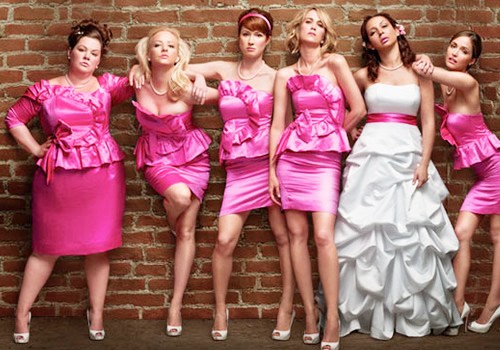“”Bridesmaids,”” the newest comedy from prolific producer Judd Apatow, is not so much a chick flick as a flick about chicks. Kristen Wiig plays Annie, a 30-something failed bakery owner who, like all Apatow heroes, pratfalls her way through the crucible of sexuality and human relationships.
Framed by females preparing for a wedding, “”Bridesmaids”” might seem like a deviation from the rote plot arcs and genital jokes of Apatow’s male-focused filmography. But 10 minutes in, Wiig plants her arms akimbo, leans flat-backed over a café table and winks one eye shut in her earnest impersonation of a particularly “”intimidating”” penis.
Is “”Bridesmaids”” a revolutionary voice for feminist comedy, or is it proof that gender is irrelevant in the modern sex romp? Think about that while we compare the elements of “”Bridesmaids”” to Apatow’s other hit flicks:
The quirky protagonist:
Annie (Wiig) just wishes her girlfriends and boudoir buddies would see her for the loyal friend/passionate lover she is. So obsessed with being appreciated is Annie, she wakes up 10 minutes before her friend-with-benefits-du-jour (a perfectly douche-y Jon Hamm) to primp her lips and locks before sneaking back under the covers. In one scene, snubbed by lovers and flaked on by friends, Annie drowns her sorrows in cupcake craft. With an armory of brushes and basters she creates a single meticulous, flowery masterpiece that would make Monet weep. Then she eats it.
Sort of like: Steve Carell as Andy in “”The 40-Year-Old Virgin.”” Andy and Annie face similar problems — Andy can’t get anyone into his bed; Annie can’t get anyone to let her stay in theirs — and both deal with their problems through equally inane modes of escape. While Andy applies paint to miniature models of the “”Six Million Dollar Man”” cast under a heavy-duty magnifier, Annie applies colored frosting to marzipan flower petals. To boot, both protagonists face the inward struggle of taking responsibility for the faults in their lives, and escaping their arrested social/romantic development.
The not-such-an-asshole-after-all antagonist:
Even more important to Annie than the respect of a lover is the respect of her oldest friend Lillian (Maya Rudolph). As Lillian’s maid of honor, Annie must clash garters with Helen (Rose Byrne), a fellow bridesmaid and new friend of Lillian who is encroaching on that coveted “”bestie”” slot. A beautiful heiress, Helen is a blue-blooded bitch who sweats designer-label extravagance. Petty as she seems in opening scenes, it’s hard not to sympathize when Helen is spited by an absent husband and snotty stepkids. She acts, like Annie, only to be appreciated — and Rose Byrne is cute enough that that’s just fine.
Sort of like: Russell Brand as Aldous Snow in “”Forgetting Sarah Marshall.”” Aldous is a hopped-up rock-n-roll yogi, which is the last sort of person you want competing for your superficial ex’s attention. But eventually when Aldous proves to be a totally friendly guy, even more receptive to Sarah Marshall’s bitchy conceit than her grieving ex was, it’s hard not to love him. Same goes for McLovin in “”Superbad,”” at first an annoying snot, but later a quality friend and certified, gas-tank-shooting BAMF.
The “”WTF?!”” set piece:
Because Annie thought it a fine idea to treat the bridesmaids to some Brazilian food before getting fitted for dresses, a routine disagreement between Annie and Helen over price points degenerates into a pink lace puke fest. Wendi McLendon-Covey (“”Reno 911″”), Ellie Kemper (“”The Office””) and Melissa McCarthy (“”Gilmore Girls””) rush the marble-topped bathroom of the poshest shop in town to discharge all matter of human goo on and around each other’s heads. Meanwhile, Lillian waddles into the street in a wedding dress, and shits herself. “”WTF?!”” and “”LOL.””
Sort of like: The all-newscaster street brawl in “”Anchorman.”” Sandwiched between plot points, this violently absurd set piece is freaked with horses, burning men and trident-induced murder. In “”Pineapple Express,”” see the Danny McBride apartment throwdown, in which custom bongs and toilet water become viable weapons, or the explosion-and-machine-gun-charged finale in Gary Cole’s pot playground. In the wise words of Ron Burgundy, “”That escalated quickly.””
Whether watching Wiig or Rogen try to find sex, love and appreciation for 90 minutes, the story remains elementally the same. Consider this an endorsement for “”Bridesmaids”” if you’ve appreciated any of Judd’s jobs in the last decade. Just don’t consider it a gender revolution.









